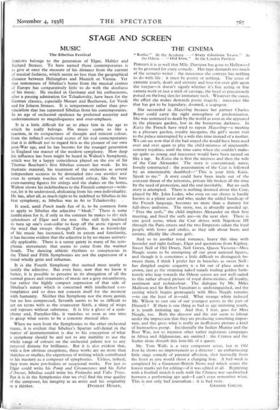MUSIC
STAGE AND SCREEN
The Sibelius Festival Stamus belongs to the generation of Elgar, Mahler and Richard Strauss. To have named those contemporaries is to give at once the measure of his distance from the current of musical fashions, which seems no 'less than the geographical distance between Helsingfors and Munich or Vienna. Yet that remoteness of Sibelius's home from the musical centres of Europe has comparatively little to do with the aloofness of his music. He studied in Germany and his enthusiasms, after a passing admiration for Tchaikovsky, have been for the German classics, especially Mozart and Beethoven, for Verdi and for Johann Strauss. It is temperament rather than pro- vincialism that has separated Sibelius from his contemporaries. In an age of orchestral opulence he preferred austerity and understatement to magniloquence and over-emphasis.
It is a little difficult for us to place him in the age to which he really belongs. His music seems so like a reaction, in its compactness of thought and reticent colour, from the inflated orchestral scores of his real contemporaries that it is difficult not to regard him as the pioneer of our own post-War age, and he has become for the younger generation in England the master of the modern symphony. How deep his, influence has been might be heard in Walton's Symphony, which was by a happy coincidence played on the eve of Sir Thomas Beecham's first Sibelius concert last week. In his thematic material, his treatment of the orchestra as several independent sections to be dovetailed into one another and even in certain touches of orchestral colour, like the bare even-running figures for strings and the shakes on the horns, Walton shows his indebtedness to the Finnish composer—with- out, let it be understood, abdicating from his own individuality. He has, after all, as much right to be indebted to Sibelius in his first symphony, as Sibelius was in his to Tchaikovsky.
It used, until Punch made fun of it, to be common form to apply to Sibelius the adjective " bleak." There is some justification for it, if only in the contrast he makes to the rich splendours of Elgar and the rest. One still feels inclined to turn up one's coat-collar to keep off the arctic rigours of the wind that sweeps through Tapiola. But as knowledge of his music has increased, both in extent and familiarity, it has become evident that the adjective is by no means univers- ally applicable. There is a sunny gaiety in many of his sym- phonic movements that seems to come from the warmer South. The dancing athletic rhythms so conspicuous in the Third and Fifth Symphonies are not the expression of a mind wholly grim and inhuman.
It is the Fourth Symphony that seemed most nearly to justify the adjective. But even here, now that we know it better, it is possible to perceive in its abnegation of all the normal graces and ornaments of music not a grey misanthropy, but rather the highly compact expression of that side of Sibelius's nature which is concerned with intellectual con- templation and so does not concern itself for the moment with humanity. Neither this Symphony nor the more genial, but no less compressed, Seventh seems to be so difficult to get on terms with as the evanescent Sixth, a thing of wisps and vapours without substance. It is like a ghost of a sym- phony and, Eurydice-like, it vanishes so soon as one tries to grasp what seems to be a concrete musical idea.
When we turn from the Symphonies to the other orchestral music, it is evident that Sibelius's Spartan self-denial in the matter of instrumentation is due to his conception of what a symphony should be and not to any inability to use the whole range of colours on the orchestral palette nor to any personal distaite for brilliance. But it is also evident that, with a few obvious exceptions, these works are no more than sketches or studies, the experience of writing which contributed to his mastery as a composer of symphonies. Unless, indeed, they were mere pot-boilers or occasional works. For just as Elgar could write his Pomp and Circumstance and his Salut d'Amour, Sibelius could write his Finlandia and Voice Triste. But it is in the Symphonies that we shall find the true quality of the composer, his integrity as an artist and his originality










































 Previous page
Previous page